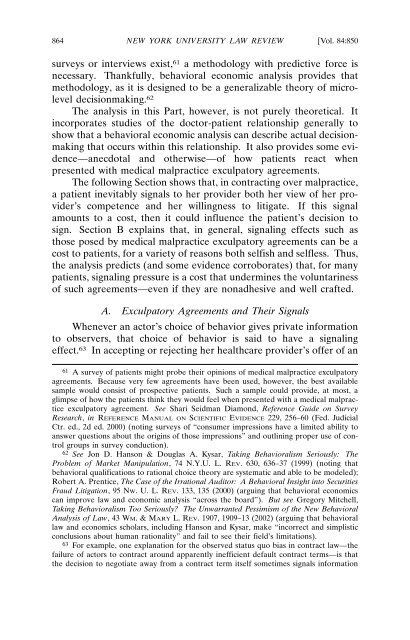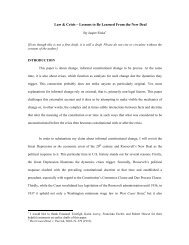In Search of an Enforceable Medical Malpractice Exculpatory
In Search of an Enforceable Medical Malpractice Exculpatory
In Search of an Enforceable Medical Malpractice Exculpatory
Create successful ePaper yourself
Turn your PDF publications into a flip-book with our unique Google optimized e-Paper software.
864 NEW YORK UNIVERSITY LAW REVIEW [Vol. 84:850<br />
surveys or interviews exist, 61 a methodology with predictive force is<br />
necessary. Th<strong>an</strong>kfully, behavioral economic <strong>an</strong>alysis provides that<br />
methodology, as it is designed to be a generalizable theory <strong>of</strong> microlevel<br />
decisionmaking. 62<br />
The <strong>an</strong>alysis in this Part, however, is not purely theoretical. It<br />
incorporates studies <strong>of</strong> the doctor-patient relationship generally to<br />
show that a behavioral economic <strong>an</strong>alysis c<strong>an</strong> describe actual decisionmaking<br />
that occurs within this relationship. It also provides some evidence—<strong>an</strong>ecdotal<br />
<strong>an</strong>d otherwise—<strong>of</strong> how patients react when<br />
presented with medical malpractice exculpatory agreements.<br />
The following Section shows that, in contracting over malpractice,<br />
a patient inevitably signals to her provider both her view <strong>of</strong> her provider’s<br />
competence <strong>an</strong>d her willingness to litigate. If this signal<br />
amounts to a cost, then it could influence the patient’s decision to<br />
sign. Section B explains that, in general, signaling effects such as<br />
those posed by medical malpractice exculpatory agreements c<strong>an</strong> be a<br />
cost to patients, for a variety <strong>of</strong> reasons both selfish <strong>an</strong>d selfless. Thus,<br />
the <strong>an</strong>alysis predicts (<strong>an</strong>d some evidence corroborates) that, for m<strong>an</strong>y<br />
patients, signaling pressure is a cost that undermines the voluntariness<br />
<strong>of</strong> such agreements—even if they are nonadhesive <strong>an</strong>d well crafted.<br />
A. <strong>Exculpatory</strong> Agreements <strong>an</strong>d Their Signals<br />
Whenever <strong>an</strong> actor’s choice <strong>of</strong> behavior gives private information<br />
to observers, that choice <strong>of</strong> behavior is said to have a signaling<br />
effect. 63 <strong>In</strong> accepting or rejecting her healthcare provider’s <strong>of</strong>fer <strong>of</strong> <strong>an</strong><br />
61 A survey <strong>of</strong> patients might probe their opinions <strong>of</strong> medical malpractice exculpatory<br />
agreements. Because very few agreements have been used, however, the best available<br />
sample would consist <strong>of</strong> prospective patients. Such a sample could provide, at most, a<br />
glimpse <strong>of</strong> how the patients think they would feel when presented with a medical malpractice<br />
exculpatory agreement. See Shari Seidm<strong>an</strong> Diamond, Reference Guide on Survey<br />
Research, in REFERENCE MANUAL ON SCIENTIFIC EVIDENCE 229, 256–60 (Fed. Judicial<br />
Ctr. ed., 2d ed. 2000) (noting surveys <strong>of</strong> “consumer impressions have a limited ability to<br />
<strong>an</strong>swer questions about the origins <strong>of</strong> those impressions” <strong>an</strong>d outlining proper use <strong>of</strong> control<br />
groups in survey conduction).<br />
62 See Jon D. H<strong>an</strong>son & Douglas A. Kysar, Taking Behavioralism Seriously: The<br />
Problem <strong>of</strong> Market M<strong>an</strong>ipulation, 74 N.Y.U. L. REV. 630, 636–37 (1999) (noting that<br />
behavioral qualifications to rational choice theory are systematic <strong>an</strong>d able to be modeled);<br />
Robert A. Prentice, The Case <strong>of</strong> the Irrational Auditor: A Behavioral <strong>In</strong>sight into Securities<br />
Fraud Litigation, 95 NW. U. L. REV. 133, 135 (2000) (arguing that behavioral economics<br />
c<strong>an</strong> improve law <strong>an</strong>d economic <strong>an</strong>alysis “across the board”). But see Gregory Mitchell,<br />
Taking Behavioralism Too Seriously? The Unwarr<strong>an</strong>ted Pessimism <strong>of</strong> the New Behavioral<br />
Analysis <strong>of</strong> Law, 43 WM. & MARY L. REV. 1907, 1909–13 (2002) (arguing that behavioral<br />
law <strong>an</strong>d economics scholars, including H<strong>an</strong>son <strong>an</strong>d Kysar, make “incorrect <strong>an</strong>d simplistic<br />
conclusions about hum<strong>an</strong> rationality” <strong>an</strong>d fail to see their field’s limitations).<br />
63 For example, one expl<strong>an</strong>ation for the observed status quo bias in contract law—the<br />
failure <strong>of</strong> actors to contract around apparently inefficient default contract terms—is that<br />
the decision to negotiate away from a contract term itself sometimes signals information
















